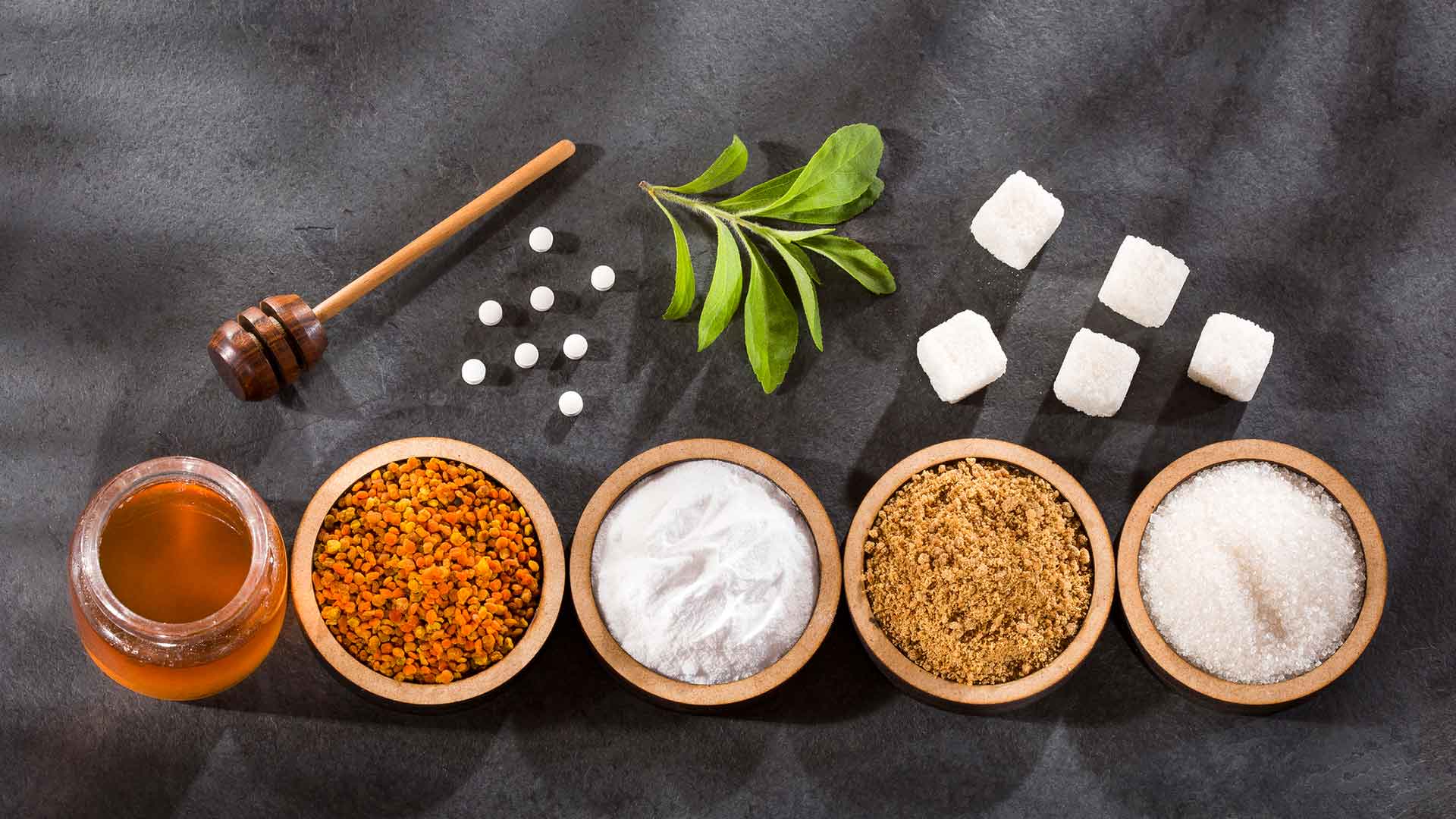Sugar consumption is linked to obesity, diabetes, heart disease, and inflammation. Naturally, many people turn to “healthier sugar alternatives” — stevia, monkfruit, honey, jaggery, coconut sugar, aspartame, sucralose, erythritol, dates, and maple syrup.
But here’s the big question: are these alternatives truly healthy, or is avoiding them altogether the best choice?
🚫 Why Avoiding All Sweeteners Can Be Healthiest
-
Resets your palate – even zero-calorie sweeteners keep your brain addicted to sweet taste.
-
Supports gut and hormone balance – some artificial options may alter gut microbiota or affect insulin in sensitive people.
-
Breaks the “sweet cycle” – constantly replacing sugar with alternatives doesn’t cure cravings.
Still, sugar substitutes may help as a transition tool — especially for people with diabetes or obesity — if used in moderation.
📊 Comparison of 10 Common Sugar Alternatives
1. Stevia
-
GI: 0
-
Pros: Natural, zero-calorie, safe for diabetics, no blood sugar spike.
-
Cons: Bitter aftertaste for some, may cause bloating in excess.
-
Cancer: No link found.
-
Gut/Heart: Generally safe; no major adverse evidence.
👉 Rating: 9/10
2. Monkfruit Sweetener
-
GI: 0
-
Pros: Natural, zero-calorie, antioxidant properties, safe in diabetes.
-
Cons: Expensive, often blended with other fillers.
-
Cancer: No link.
-
Gut/Heart: No known risks.
👉 Rating: 9/10
3. Honey
-
GI: 58–60 (similar to sugar)
-
Pros: Natural, contains antioxidants and trace nutrients.
-
Cons: Still high in sugar and calories; raises blood glucose.
-
Cancer: No risk, but excessive intake contributes to obesity-related risks.
-
Gut/Heart: Can promote better cough relief, but not suitable for diabetes control.
👉 Rating: 5/10
4. Dates
-
GI: 42–55 (lower than sugar)
-
Pros: Natural, contain fiber, potassium, and micronutrients.
-
Cons: Calorie dense; raise blood sugar if overconsumed.
-
Cancer: No link; antioxidant-rich, may offer protective benefits.
-
Gut/Heart: Better than refined sugar thanks to fiber and nutrients.
👉 Rating: 7/10
5. Coconut Sugar
-
GI: ~54
-
Pros: Trace minerals, slightly lower GI than white sugar.
-
Cons: Nearly same calories and carbs as sugar; raises glucose.
-
Cancer: No link.
-
Gut/Heart: No proven benefits; still adds excess calories.
👉 Rating: 5/10
6. Jaggery (Gur)
-
GI: ~84 (higher than table sugar)
-
Pros: Contains iron and minerals, “natural” image.
-
Cons: High GI; spikes blood sugar; same calories as sugar.
-
Cancer: No link.
-
Gut/Heart: No advantage over sugar; risky for diabetics.
👉 Rating: 4/10
7. Maple Syrup
-
GI: ~54
-
Pros: Contains antioxidants, zinc, manganese.
-
Cons: Still sugar; high calorie.
-
Cancer: No link.
-
Gut/Heart: No unique benefits beyond trace nutrients.
👉 Rating: 5/10
8. Aspartame (Artificial Sweetener)
-
GI: 0
-
Pros: Zero calories, no glucose spike, widely studied.
-
Cons: Controversial safety image.
-
Cancer: Classified by WHO (IARC, 2023) as “possibly carcinogenic” at high intakes — evidence is limited, not conclusive. Safe below 40 mg/kg/day (about 9–14 cans of diet soda for a 70 kg adult).
-
Gut/Heart: No proven heart risks; some people report headaches.
👉 Rating: 1/10 (safety concern)
9. Sucralose (Splenda)
-
GI: 0
-
Pros: Zero calorie, widely used, doesn’t spike blood sugar.
-
Cons: May alter gut microbiome; can form harmful compounds when heated at very high temperatures.
-
Cancer: No human link found; safe within daily intake.
-
Gut/Heart: Possible microbiome impact.
👉 Rating: 1/10 (safety concern)
10. Erythritol (Sugar Alcohol)
-
GI: 0–1
-
Pros: Almost zero calories, doesn’t spike blood sugar.
-
Cons: In high amounts, may cause bloating or diarrhea.
-
Cancer: No evidence linking to cancer.
-
Heart: 2023 study found higher blood erythritol levels associated with cardiovascular events, but this was correlation, not proven cause. Research is ongoing.
👉 Rating: 1/10 (safety concern)
📊 Comparison of Sugar Alternatives
| Sweetener | Glycemic Index (GI) | Pros | Cons | Cancer / Gut / Heart Concerns | Rating (1–10) |
|---|---|---|---|---|---|
| Stevia | 0 | Natural, zero calorie, safe for diabetics | Bitter aftertaste, mild bloating in excess | No cancer link; safe overall | 9/10 |
| Monkfruit | 0 | Natural, zero calorie, antioxidant-rich | Expensive, less available | No cancer link; safe overall | 9/10 |
| Honey | 58–60 | Natural, antioxidants | High sugar & calories, raises glucose | No cancer link; safe in moderation | 5/10 |
| Dates | 42–55 | Fiber, potassium, antioxidants | Calorie dense, raises glucose if overdone | No cancer link; protective due to antioxidants | 6/10 |
| Coconut Sugar | ~54 | Trace minerals, slightly lower GI than sugar | High in sugar/calories | No cancer link | 4/10 |
| Jaggery | ~84 | Contains iron, minerals | Very high GI, spikes blood sugar | No cancer link | 4/10 |
| Maple Syrup | ~54 | Contains zinc, manganese, antioxidants | High calorie, raises glucose | No cancer link | 5/10 |
| Aspartame | 0 | Zero calorie, well-studied | Controversial, artificial | Possibly carcinogenic (WHO 2023) at very high intakes; safe below 40 mg/kg/day | 1/10 |
| Sucralose | 0 | Zero calorie, doesn’t spike glucose | May affect gut microbiome; not heat-stable | No cancer link; possible gut impact | 1/10 |
| Erythritol | 0–1 | Almost zero calories, safe for diabetics | Can cause bloating/diarrhea in excess | No cancer link; 2023 study linked high levels to heart risk (not proven causal) | 1/10 |
✅ Bottom Line
-
Best options (in moderation): Stevia, Monkfruit.
-
Okay sometimes: Dates, Maple syrup, Honey.
-
Not much better than sugar: Jaggery, Coconut sugar.
-
Artificial options: Aspartame and Sucralose are considered safe at normal intake, but long-term concerns about gut health and (for aspartame) a possible cancer link make natural options preferable.
🌿 Healthiest Choice?
The healthiest long-term strategy is not to rely on any sugar alternative — but to reduce your overall need for sweetness. Use fruit for natural sweetness, focus on protein and fiber to control cravings, and retrain your palate.

Akanksha Sharma
Dr. Akanksha Sharma, Head Writer and creator of AtoZ of Pregnancy, is dedicated to empowering women, parents, and families through 360-degree knowledge. She and her team provide evidence-based advice to guide families through pregnancy, parenting and beyond.






